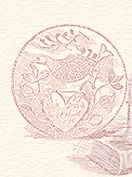Ihr liewe Leit:
Fer Yuni, 1905 hot der Kallennermann, der
Henry A. Schuler (1850-1908) gschriwwe:
"Warm mol der lengscht Daag kummt, iss es
Graas ausgewaxe, un noh geht's ans Hoimache. 'S
Hoimache iss freilich nimmi wie's vor alders waar.
Do hen sie als 's Graas mit der Sens gemeeht, un's
hot als drei, vier Woche genumme bis 's Hoi all
eigfaahre waar.
"'S aerscht hen sie lauder deitsche Sense
geyust; noh hen sie als marriyeds un middaags
ghockt un gedengelt . . ." "June and Juli":
Der Frank Brunner (1835-1908) hot in seim In June we cut hay,
Gedicht "Der Yuni un der Yuli" gschriwwe:
Im Yuni hen mer Hoi gemacht,
Was hen mer als gemeeht
Mit deitsche Sense, un gelacht;
Die Meed hen's Graas verschtreeht.
Un in seirn Gedicht "'S Meehe mit der deitsche
Sens" hot der Eli Keller (1825-1919) gschriwwe:
Wie endlich mol der Daag iss kumme,
Der lengscht schunn waar beschtimmt,
Hot yeder frieh sei Sens genumme
Un firsrt-rate abgetrimmt.
Klop, klop, klop,
Hinnerm Haus uff me yede Block;
Klop, klop, klop,
Uff me schmaale odder breede Schtock.
Was waar's en Geglebbeer,
En Schpautz un Geschnebber
En Gewenn un Gedreh
Mit de Hend un de Beh!
Klop, klop, klop,
Yedi deitschi Sens dengelt mer sich raus,
Klop, klop, klop,
Vanne vurn Schpitze bis gans hinne naus.
Der Keller schreibt, "Yedi deitschi Sens
dengelt mer sich raus." Was bedeidt sell?
En echdi deitschi Sens hot mer scharreff
gemacht mit me gleene Hammer (der Dengelham
mer) un me gleene Amboss (der Dengelschtock).
Sell Scharrefmache hen sie "dengle" gheese.
Am ee End vurn Denge1schtock iss der glee
Amboss, am annere End iss der Dengelschtock
gans gschpitzt, un der Dengler hot aerscht der
SchLock mit ern Schpitz in en Poschde odder
Schtumbe ghaue.
Dann hot er die Senskling uff der Dengel
schtock geduh un hot sie middem Hammer geg
lobbt bis die Kling gans scharref waar. Wie ihr eich
denke kermt, waar die Kling aus zimmlich weichem
Metaal gemacht.
Die englische Sense waare aus viel hedder
Metaal gemacht warre, un mer hot sie am Schleif
schtee schleife misse.
Macht's gut,
Der Alt Professer
|
Dear people:
For June, 1905, the Almanac Man,
Henry A. Schuler (1850-1908) wrote:
"When once the longest day comes, the grass has matured, and then they start in to cut the hay. Haymaking is of course no longer the way it used to be in olden times. Then they used to mow the grass with the scythe, and it used to take three, four weeks until the hay was all driven into the barn.
"At first they used nothing but German scythes; then they. used to sit mornings and noons and hammered out the blades . . ."
Frank Brunner (1835-1908) wrote in his poem
How we used to mow
With German scythes, and laughed;
The girls would spread the grass.
And in his poem "Mowing with the German Scythe" Eli Keller (1825-1919) wrote:
When finally the day came,
That long had been determined,
Everyone early took his scythe and trimmed it first-rate.
Tap, tap, tap,
Behind the house on every stump;
Tap, tap, tap,
On a narrow or wide anvil.
What a rattling,
A splitting and turning
With the hands and the legs!
Tap, tap, tap,
One hammers out every German scythe,
Tap, tap, tap,
From the point in front to the back.
Keller writes, "Every German scythe is hammered out." What does that mean?
A genuine German scythe was made sharp with a little hammer (the tapping hammer) and a little anvil (the tapping anvil). They called such sharpening "dengling" (sharpening by hammering).
At one end of the piece is the little anvil, at the other end the piece is sharpened, and the sharpener first knocked the piece into a post or stump with the sharp end.
Then he put the scythe blade onto the little anvil and tapped it until the blade was sharpened. As you can imagine, the blade was made out of relatively soft metal.
The English scythes were made out of much harder metal, and one had to grind them on a grindstone.
Take care,
The Old Professor
|













